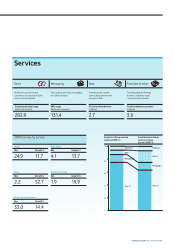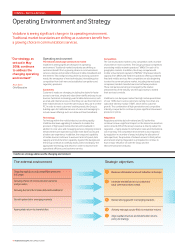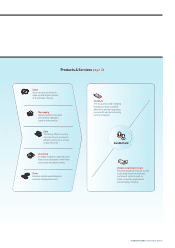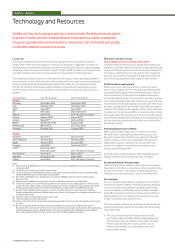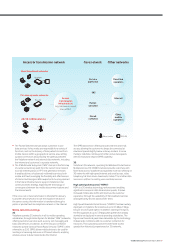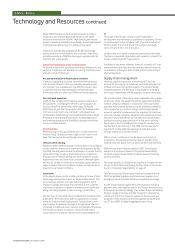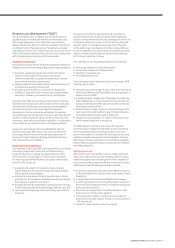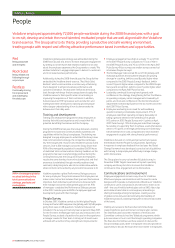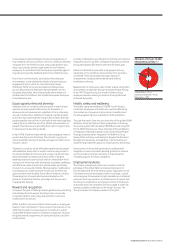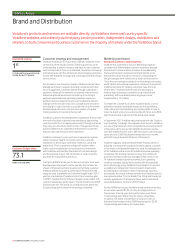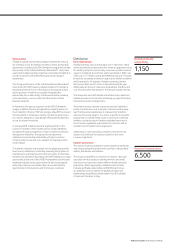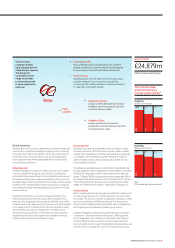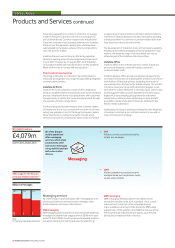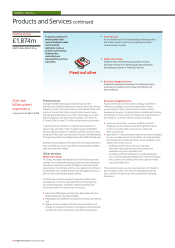Vodafone 2008 Annual Report Download - page 21
Download and view the complete annual report
Please find page 21 of the 2008 Vodafone annual report below. You can navigate through the pages in the report by either clicking on the pages listed below, or by using the keyword search tool below to find specific information within the annual report.
Research and development (“R&D”)
The Group R&D function comprises an international team for
applied research in mobile and internet communications and
their related applications. Group R&D teams are located in
Newbury, Maastricht, Munich, California and Madrid, and there is
an affiliated team in Paris belonging to Vodafone’s associated
undertaking in France, SFR. A small team was set up at the end of
2007 in the Vodafone Beijing office to work in close collaboration
with China Mobile and a number of Chinese vendors.
Function of Group R&D
Group R&D works beyond the traditional established markets of
Vodafone in search of technology based business opportunities by:
delivering a systematic programme of demand inspired
research and development in wireless and internet
communications that is positioned between basic research
and commercial product development;
leading Vodafone’s work with technical standards bodies and
its intellectual property activities; and
providing a route for start-up companies to engage with
Vodafone. Group R&D is also in the process of establishing a
laboratory in Newbury to evaluate start-up technologies.
Typically, Group R&D starts working on developments that are
expected to be introduced into the business in three to five years,
and leads them until a year or so before full commercialisation.
Currently the horizon covers some significant business
developments that can already be anticipated. For example,
Group R&D leads the introduction of wireless technology beyond
3G and is researching the next phase of the emergence of the
internet as a personal communications platform– including radio
technologies for accessing the internet in emerging markets.
Governance is provided by the Group R&D Board, which is
chaired by the Group R&D Director and consists of the chief
technology officers from six of the operating subsidiaries in
Europe, the heads of Business Strategy and Global Terminals
and a representative from EMAPA.
Group R&D work programme
The emphasis of the Group R&D work programme is on providing
technology analysis and a vision that contributes directly
to business decisions, enabling new applications of mobile
communications, technology for new services and research
for improving operational efficiency and quality of the Group’s
networks. This is done by:
pioneering the adoption of new technologies, business
opportunities and innovations through technology analysis,
trials, invention and prototypes;
making the Group aware of market opportunities or threats
posed by new technologies and business models and helping
the Company to exploit or resist them;
providing technology leadership by working with the industry
to define and standardise the technology Vodafone uses; and
securing intellectual property and technology ownership for
the Group.
•
•
•
•
•
•
•
The work of Group R&D is delivered through a portfolio of
programmes and cross industry activities with a substantial
number of trials, demonstrations and prototypes. All work is set
in a business and social context, and must lead to intellectual
property rights or to Vodafone having significant influence
on the technology it will deploy in the future. Group R&D also
provides leadership for funding research into health and safety
aspects of mobile communications and technical leadership
for the Group’s spectrum strategy.
The main themes currently being researched are as follows:
the next generation of mobile technologies;
consumable software for mobile phones;
electronic newsmedia; and
new GSM based services.
There have been several significant advances during the 2008
financial year including:
next generation technology field trials have been announced
with Verizon Wireless and China Mobile and are expected to
begin in summer 2008;
a system has been designed and standardised to enable the
SIM in GSM phones to control nearfield communications for
transport ticketing and other applications, with commercial
trials planned for late 2008;
demonstration of mobile software, social networks and the
open source innovation platform called Vodafone Betavine
at the Mobile World Congress and at Cebit; and
research into the application of mobile communications to
health and well being and to energy use.
The R&D programme provides the Group with long term
technical policy, strategy and leadership, as well as providing
technical underpinning for the Group’s public policies and
government relations. It is shared with all Group functions and
Vodafone operating companies. Commercialisation of Group
R&D results is through submissions to international standards
bodies, intellectual property filings and directly with Vodafone
operating companies.
Collaborative work
Much of the work of Group R&D is done in collaboration with
others, both within the Group and externally, with the Group’s
traditional suppliers and increasingly with other companies in
the communications, media and internet industries. During the
2008 financial year the following has been achieved:
a research collaboration was started with IBM which has led
to the development of a mobile private social network called
BuddyCom;
a research agreement was also established with Huawei;
a continuing programme of work with academic institutions,
which includes student placements in Vodafone laboratories
during summer vacations;
the continued development of Vodafone Betavine, a web
based research and innovation platform;
the hosting of an academic conference where academic
partners were brought together to launch a new programme
– 3D internet; and
academic collaborations in India have started.
•
•
•
•
•
•
•
•
•
•
•
•
•
•
Vodafone Group Plc Annual Report 2008 19


